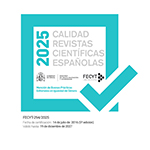Alexander y Wilhelm von Humboldt: la ciencia de la naturaleza y la ciencia del lenguaje frente a la realidad americana
Abstract
The present article examines the methodological influence of Alexander von Humboldt on Wilhelm von Humboldt’s theory of language. W. v. Humboldt’s studies of American languages, starting with his “Essai sur les langues du nouveau continent” (1812), evidence not just documentary elements from the geographer’s ethnological and naturalist research, but also various aspects of his method. This is connected with the proximity between the natural philosophy and the linguistic studies of Romanticism. On the other hand, the points of view of the researcher and those of the traveler are frequently juxtaposed in A. v. Humboldt’s essays on the American continent. In particular, in Vues des Cordillères et monuments des peuples indigènes de l’Amérique (vol. XV and XVI of Voyage aux regions équinoxiales du nouveau continent) the treatment of nature as an imaginary, poetic representation of the Naturganzes, the objective expression of which are the natural and cultural monuments. Here the aim is to prove that the praxis of the language researcher needed the complement of the diaries, letters and chronicles of A. v. Humboldt in order to compose, also by way of a narrative, the objective reality of the American languages as a class of phenomena ordered by the laws of language.Downloads
Article download
License
In order to support the global exchange of knowledge, the journal Revista de Filología Alemana is allowing unrestricted access to its content as from its publication in this electronic edition, and as such it is an open-access journal. The originals published in this journal are the property of the Complutense University of Madrid and any reproduction thereof in full or in part must cite the source. All content is distributed under a Creative Commons Attribution 4.0 use and distribution licence (CC BY 4.0). This circumstance must be expressly stated in these terms where necessary. You can view the summary and the complete legal text of the licence.










